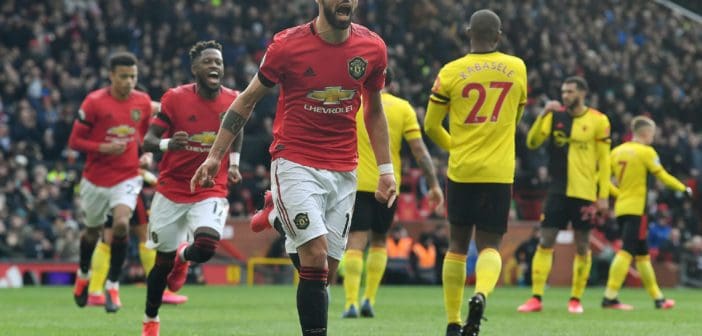Cast your mind back to the 22nd of January. A wet and windy night in the north-west as Manchester United had just lost 2-0 at home to mid-table Burnley. It put the Red Devils six points off of the pace in the fight for a top four finish and fourteen points behind the high-flying Leicester City in 3rd.
What was even more shocking though was the fact that, despite being in 5th place, United were only four points above 14th placed Newcastle; Ole Gunnar Solskjaer’s side looked drab and Champions League qualification seemed a huge ask.
Fast forward six months (yet somehow just fourteen matchweeks, 2020 eh?) and United have finished in 3rd place, securing their place in Europe’s elite competition for the 2020/21 campaign…above Leicester who finished 5th. It wasn’t comfortable, it certainly wasn’t pretty towards the end, but United miraculously recovered, and were lucky that Leicester miraculously self-imploded, to put themselves in the position where a final day clash against the Foxes would decide whether they would qualify for the Champions League or not.
A 2-0 win at the King Power rounded off an impressive 14-match unbeaten run in the Premier League which saw United climb up the table into the top four of England’s top flight. But what did this heroic upturn in fortunes come down to? A change in leadership? No. A change in tactics? To some extent but not particularly. Arguably the biggest and most significant catalyst for United’s drastic change in fortunes was a certain signing from Portugal named Bruno Fernandes.
The former Sporting Lisbon playmaker had been on the cusp of a Premier League move for a couple of summers, being linked with West Ham back in 2018 and was on Manchester United and Manchester City’s radars last summer, but the potential move to the north-west fizzling out which saw the 25-year-old remain at the Jose Alvalade Stadium for another five months. His eye for a forward pass and impressive long-range shooting ability made clubs in England drool over the possibility of landing his signature.
A lack of creativity was still proving to be an unsolved issue for United though, who swooped back in for the midfielder in January and was able to acquire his signature a day before the window closed, paying Sporting a whopping €55m.
The Portuguese made his debut at the Theatre of Dreams just three days later, playing the full 90 minutes in a dire 0-0 stalemate with Wolves, a game which reflected the United prior to Fernandes’ arrival. However, the midfielder would only fail to register at least one goal or assist in a Premier League match three more times during the rest of the season.
Despite their colossal reputation, Manchester United were scoring an underwhelming amount of goals before Fernandes’ arrival, and not just in the 2019/20 campaign. Before Fernandes’ arrival, United were scoring 1.5 goals per Premier League game, in 2018/19 they scored 1.7 goals per league match and the season prior 1.8. What was already a relatively low stat for a side competing for a Champions League spot was decreasing.
Without watching a minute of the playmaker perform on the pitch you can identify how significant his arrival in Manchester was for United, whose Premier League goals per game ratio rocketed to 2.3 goals per game in the fourteen league outings following Fernandes’ arrival, with the Portuguese missing just 67 minutes in that time.
Ten goals and eight assists in his first 20 games in all competitions is certainly an impressive record, so much so that the 25-year-old was awarded back-to-back Premier League player of the month awards in his first two months at Old Trafford. However, with six of these ten goals coming from the penalty spot, there have been some claims (mainly from opposition fans) that the midfielder is slightly overrated given that his goal tally has been benefited by the fact that Manchester United were awarded 14 penalties during the season. This really isn’t the case when you compare Fernandes’ performances to those of his United colleagues before his arrival.
Having a natural roaming number ten in the side has brought balance to and increased the focal points of United’s attack, which struggled during Marcus Rashford’s injury layoff. The midfielder is able to draw opposition defenders away from his fellow attackers on the edge of the box due to his exceptional long-range shooting ability and rapid link-up play, allowing them a decent opportunity to put the ball in the back of the net.
Anthony Martial’s post-lockdown form is a key example of this. The Frenchman recorded a goal involvement every 75.5 minutes during the Premier League restart, most notably scoring a hattrick against Sheffield United. Prior to the return to football in June, Martial was involved in a goal every 157 minutes. With Fernandes creating 2.3 chances per game, the United attackers, particularly Martial, have benefitted.
Fernandes’ presence as a roaming number ten in this United side gives defenders a hell of a lot more to worry about, which is why the Portuguese international has been the key to unlocking the United forward-line’s potential and why United will significantly benefit having him amongst their ranks from the start of next season and will be a much more competitive outfit throughout the campaign because of him.
Follow us on Twitter @ProstInt
![Prost International [PINT]](https://prostinternational.com/wp-content/uploads/2021/08/PINTtFontLogoRoboto1536x78.jpg)



